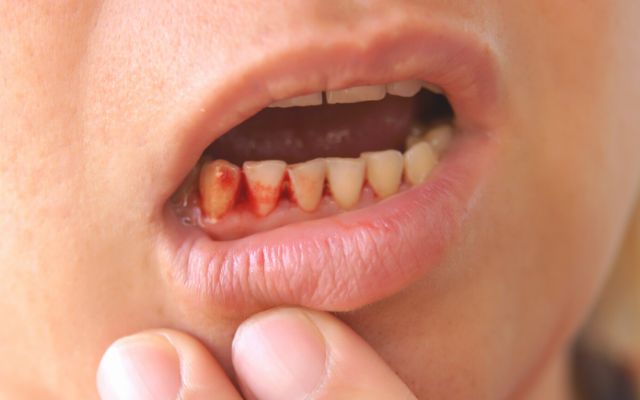Healthy Gums: You might have questions about how to improve your gum health or prevent gum disease. If you have encountered the early signs of gum disease or would wish to prevent future problems, you should consider the following steps. Continue reading for further information.
Let’s get started!

What are Healthy Gums?
Healthy Gums are pink, firm to the touch, and do not bleed. Unhealthy gums are often red, puffy, easily bleed during brushing and flossing. They may begin to separate from the teeth. It may be useful to compare your gums to images of healthy and diseased gums to obtain a general understanding of their condition.
However, take a dental checkup is the best option to consult for a gum disease diagnosis.
It may surprise you to discover that almost one in two persons over 30 years old has some form of gum disease. If you fail to identify and treat the causes of gum disease early, you run the risk of developing severe gum disease, also known as periodontitis. It is the main cause of tooth loss in adults. It may also threaten your general health, as severe gum disease has been linked to other conditions including heart disease and stroke.

Indications of Gum Disease
When it comes to the health of your mouth, it’s not all about the straightness of your teeth or the brilliance of your smile.
You cannot overlook your gums! Even if you do not have cavities and have the whitest teeth in town, you are not immune to gum disease. Since gum disease is typically painless, most people are unaware that they have it.
Bleeding gums are a warning indication that you may have gum disease. Plaque accumulation on your teeth can make your gums red, inflamed, and susceptible to bleeding. By brushing and flossing twice daily, gum disease can be prevented if detected in its gingivitis stage.
You should also visit your dentist to ensure that the condition has not caused any more complications.
Additionally, bad breath might be a sign of diseased gums:gum tissue, gum tissues, professional cleaning, fluoride toothpaste, dental checkups, natural remedies, fatty acids, anti-inflammatory properties, harmful bacteria,
What Causes Gum Disease?

In most instances, poor dental hygiene is the cause of gum disease. Plaque, a sticky, visible coating of bacteria that coats the teeth, can cause gum irritation, inflammation, and bleeding if it is not effectively removed by brushing, flossing, and rinsing.
Smoking doubles the likelihood of getting gum disease, whereas poor nutrition, certain medical diseases (such as diabetes or cardiovascular disease), a family history of periodontitis, obesity, and stress are all risk factors.
Some common medications may cause problems with gum health include:
- Antacids
- Antihistamines
- Antidepressants
- Blood pressure medications
- Decongestants
- Pain relievers
Some other potential periodontal health issues from medications include:
- Gum irritation
- Gum discoloration
- Oral sores
- Oral thrush (fungal infection)
Your Gums and Total Health
Numerous studies indicate that the health of your gums affects your entire wellbeing. As an example:
Heart Health
It has been demonstrated that moderate to severe gum disease increases inflammatory levels throughout the entire body, including the cardiovascular system. Several studies indicate that the inflammation caused by severe periodontal disease may be connected to the risk of stroke and heart disease, which is also an inflammatory illness.
Lung health
Some studies indicate that periodontal health may help persons with chronic obstructive pulmonary disease maintain their lung health (COPD). Additionally, periodontal disease might increase the likelihood of acquiring respiratory infections like pneumonia. This may result from microorganisms entering the respiratory tract via inhalation.
Nutritional health
If you lose teeth due to gum disease, it may be more difficult for you to eat nutritious foods like crisp fruits and vegetables. Problems with chewing can lead to poor nutrition, which in turn can result in weariness and dizziness, among other issues. Your grin is your calling card to the world when it comes to your emotional wellbeing.
Nutritional well-being
The majority of people feel more confident when they have a beautiful grin. According to the Academy of General Dentistry, 20 million teeth are extracted annually in the United States. And 86% of dentists indicate that social shame is one of the most common concerns reported by patients after tooth loss.
Healthy Gums Vitamins

Vitamin C
Vitamin C plays a vital role in collagen production, which is essential for healthy gums. Collagen is a protein that provides strength and support to the gums. A deficiency in vitamin C can lead to gum disease, which is characterized by bleeding, swelling, and tenderness of the gums. Good sources of vitamin C include citrus fruits, kiwis, strawberries, and broccoli.
Vitamin D
Vitamin D is important for bone health, and it also plays a role in supporting gum health. A deficiency in vitamin D can lead to inflammation of the gums and gum disease. You can get vitamin D from sunlight, fatty fish, egg yolks, and fortified foods like milk and cereal.
Vitamin K
Vitamin K is important for blood clotting and can help prevent bleeding gums. Good sources of vitamin K include leafy green vegetables like kale and spinach, as well as broccoli, brussels sprouts, and cabbage.
Vitamin B complex
B vitamins are important for overall health, including gum health. Vitamin B3, also known as niacin, can help reduce inflammation in the gums. Good sources of vitamin B complex include whole grains, meat, poultry, fish, and leafy green vegetables.
Coenzyme Q10
Coenzyme Q10 is a nutrient that is important for gum health. It helps reduce inflammation in the gums and can help prevent gum disease. Good sources of Coenzyme Q10 include fatty fish, organ meats, and whole grains.
Some Tips for Keeping Healthy Gums
Consequently, what must you do to maintain healthy gums? Here is an overview:
- Brush your teeth twice daily with fluoride toothpaste, making sure to brush around the gum line. Replace your toothbrush every three to four months.
- Use dental floss or interdental cleaners once daily.
- Rinse with an antibacterial mouthwash at least once a day.
- Visit your dentist for checkups and cleanings twice or more per year. Don’t delay if your gums are bleeding.
- Inform your dentist of any changes in your overall health, especially if you’re pregnant, nearing menopause, or have an illness like diabetes.
- Limit sugary foods and beverages, and consume a healthy diet with high-fiber fruits.
- Quit smoking, as smoking increases the risk of developing advanced periodontal disease.
How to Obtain Healthy Gums?
You can restore healthy gums if you have gingivitis by practicing good oral hygiene. Using an anti-gingivitis toothpaste, such as Crest Gum Detoxify Deep Clean, reverses early signs of gum damage and produces clinically proven healthier gums. However, periodontitis, a severe form of gum disease, necessitates a more complex approach to restore healthy gums. Your dentist may employ one of the following procedures to treat severe gum disease and encourage healthy gums:
- Root scaling and planing: This is the removal of plaque and tartar from above and below the gum line on the teeth.
- Gingivectomy: This entails the removal of diseased gum tissue and the eradication of any spaces between the teeth and gums where germs can thrive.
- Extraction: The removal of loose teeth or teeth that are severely decaying or broken.
- Flap surgery: The tooth roots are cleaned, and any bone damage is repaired.
Check Your Gums at Bassendean, Perth WA
In conclusion, taking care of your gums is crucial for your overall oral health and wellbeing.
Bleeding gums, bad breath, and inflammation are warning signs of gum disease, which can be prevented by practicing good oral hygiene habits such as brushing and flossing regularly, using antibacterial mouthwash, and visiting your dentist for checkups and cleanings.
If you’re experiencing any symptoms of gum disease or have concerns about your gum health, don’t hesitate to contact Spring Orchid Dental for a consultation with our experienced dentists. We’ll provide you with personalized recommendations and treatment options to help you achieve and maintain healthy gums for a lifetime.
FAQs
How to Obtain Sound Gums?
Regular brushing, flossing, and dental visits are the necessary measures to prevent and reverse gum disease in its early stages.
Brush twice a day using a fluoride toothpaste that kills and eliminates plaque during brushing, such as Parodontit Complete Protection. Daily flossing will eliminate plaque and food particles that your toothbrush cannot reach.
Remember to brush your tongue, as it can potentially harbour bacteria that cause bad breath.
What home remedies can I use to improve gum health?
There are several home remedies that you can use to improve gum health:
- Saltwater Rinse: Mix 1 teaspoon of salt in a cup of warm water. Swish this mixture in your mouth for a minute or two before spitting it out.
- Oil Pulling: Swish 1 tablespoon of coconut oil in your mouth for 15–20 minutes, then spit it into a trash can.
- Green Tea: Drinking green tea daily can help reduce inflammation in the gums due to its antioxidant properties.
- Aloe Vera: Apply aloe vera gel to your gums to help reduce inflammation and alleviate pain.
- Turmeric Gel: Applying turmeric gel to your gums can also help reduce inflammation and pain.





